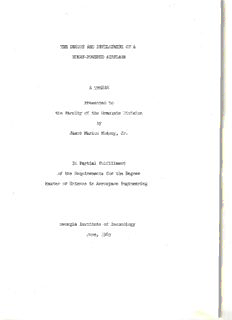
THE DESIGN AND DEVELOPMENT OF A HUMAN-POWERED AIRPLANE A THESIS Presented to ... PDF
Preview THE DESIGN AND DEVELOPMENT OF A HUMAN-POWERED AIRPLANE A THESIS Presented to ...
THE DESIGN AND DEVELOPMENT OF A HUMAN-POWERED AIRPLANE A THESIS Presented to the Faculty of the Graduate Division "by James Marion McAvoy^ Jr. In Partial Fulfillment of the Requirements for the Degree Master of Science in Aerospace Engineering Georgia Institute of Technology June _, 1963 A/ :o TEE DESIGN AND DETERMENT OF A HUMAN-POWERED AIRPLANE Approved: Pate Approved "by Chairman: M(Ly Z7. /q£3 In presenting the dissertation as a partial fulfillment of the requirements for an advanced degree from the Georgia Institute of Technology, I agree that the Library of the Institution shall make it available for inspection and circulation in accordance with its regulations governing materials of this type. I agree that permission to copy from, or to publish from, this dissertation may he granted by the professor under whose direction it was written, or, in his absence, by the dean of the Graduate Division when such copying or publication is solely for scholarly purposes and does not involve potential financial gain. It is under stood that any copying from, or publication of, this disser tation which involves potential financial gain will not be allowed without written permission. i "J-lW* 11 ACKNOWLEDGMENTS The author wishes to express his most sincere appreciation to Pro fessor John J, Harper for acting as thesis advisor, and for his ready ad vice at all times. Thanks are due also to Doctor Rohin B. Gray and Doctor Thomas W. Jackson for serving on the reading committee and for their help and ad vice . Gratitude is also extended to,all those people who aided in the construction of the MPA and to those who provided moral and physical sup port for the project. Among these are Professor Donnell W. Dutton, Mr. George W.-D. Cook, Mr. Dewey L. Ransom, Mr. John A. Ellis, Mr. David A. Shelton, Mr. Royce 1. Hall, Mr. Robert W. Ritchie, and Mr. David R. Fern. The author further wishes to acknowledge the material aid fur nished hy The Du Pont Company, Lockheed Aircraft Company of Georgia, and the Shell Chemical Corporation. Last, "but not least, the author sincerely acknowledges the help of his patient wife who typed the rough draft and who helped with the con struction. iii TABLE.OF CONTENTS Page ACiCNOWLEDGMEMTS ........... ii LIST OF FIGURES .... ...... iv LIST OF TABLES vi LIST OF SYMBOLS vii SUMMARY ........ ix CHAPTER I. INTRODUCTION 1 II. DESIGN ANALYSIS k General Considerations Preliminary Design Propulsion System Stability and Control Analysis III. RESULTS . 17 IV. CONCLUSIONS AND RECOMMENDATIONS . 21 REFERENCES 2k APPENDICES 25 iv LIST OF FIGURES Figure Page 1. Dimensional Data for MPA ...................... 19 2. Drag Polars for Four Configurations Tested 30 3. Profile Drag Polar for Constant Chord. Wing Operating Out of Ground Effect 31 k. Wing Spars ........ 34 5. Balsa Wood Ri"b Section 35 6. Ribs and Spars Joined Together — . 36 7a. Completed Wings Before Assembly to Aircraft 37 7b • Wing Internal Structures 38 7c. Wing Section Showing Aileron 39 7d. Airplane Left Side View During Final Assembly k-0 7e. Airplane Front View After Final Assembly kl • 8a. Fuselage Front View ij-3 8b. Side View of Fuselage and Shroud .. k-k 9a. Front Propeller During Construction 45 9b. Top View of Shroud While Jigged During Construction 46 9c. Side View of Shroud During Construction 47 9d. Rear View of Shroud and Propellers After Assembly to Aircraft , 48 9e. Propeller Hub and Front Shroud Mounting Struts 49 10. Camber Effect on the Section Minimum Drag Coefficient of Thick NACA Laminar Flow Airfoils at a Constant Reynolds Number as Taken from the NACA Data 52 11. Section Drag Characteristics of the NACA 65 4l8 Airfoil Taken from the War Time Report ACR.Number L4H11 53 V Figure Page 12a. Top View of Buckled Spar Cap ............................... 59 12b. Front View of Buckled Spar Cap ................. 60 12c. Bear View of Buckled Spar Cap 6l 13• Horsepower-Endurance Chart for a One Hundred and Sixty Pound Man 72 vi LIST OF TABLES Table Page 1. Propeller Section Data 67 2. Shroud Mean Camber Line 69 LIST OF SYMBOLS A Area of wing spanned by an aileron AR Aspect-ratio^ b /S b Wing span CL Airplane drag coefficient C„ Airplane skin friction drag C^ Fuselage drag coefficient based on fuselage wetted area f C Wing lift coefficient T Lt D Drag TV H Horsepower, -r^rr h Altitude L Lift M Wing bending moment due to actual loads m Wing bending moment due to.a one-pound vertical load at the tip m.a.c. Mean aerodynamic chord P Roll velocity P Euler column buckling load q. Dynamic pressure R Propeller radius r Blade station measured from center of propeller S Wing planform area T Propeller thrust V Velocity of resultant wind W Weight y Station along wing semi-span z Height of tip plate Subscripts a Aileron e Effective f Fuselage g Geometric int Interference sh Shroud tp Tip plate w Wing Greek Symbols P Blade hound vortex strength * Propeller . induced & Indicates increment of change C Correction factor "between ideal (elliptic) and true lift distributions *l Non-dimensional semi-span position^ rp- -ri Propeller efficiency -J" Aileron effectiveness 0 Angle between propeller blade resultant velocity and propeller disk V Volume flow through propeller
Description: